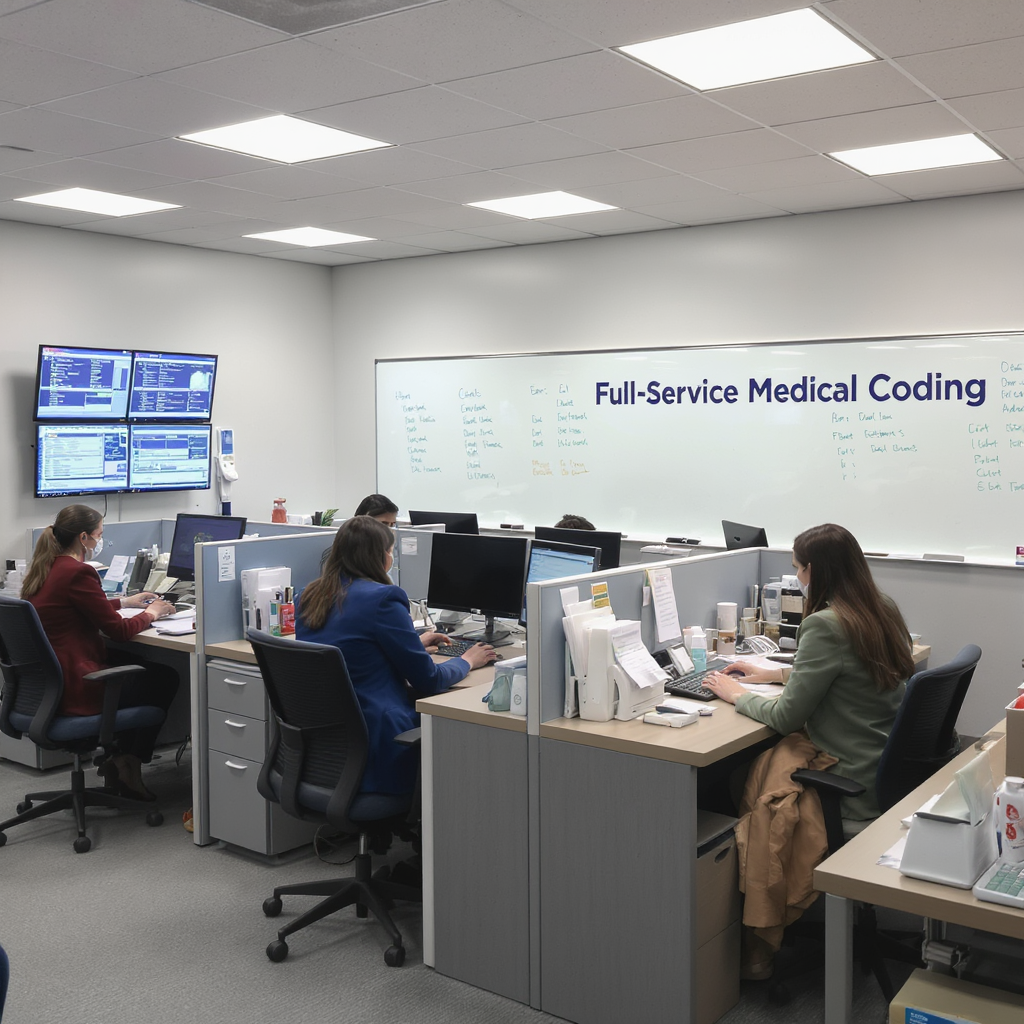The Complete Guide to Full-Service Medical Coding Companies: Your Strategic Partner in Healthcare Revenue Optimization
Medical Coding Companies
Medical Coding Companies
In today’s rapidly evolving healthcare landscape, where patient care remains the ultimate priority, there exists a critical yet often overlooked foundation that keeps the entire system functioning: medical coding. This sophisticated process transforms complex medical procedures, diagnoses, treatments, and services into standardized alphanumeric codes that serve as the universal language of healthcare administration. As healthcare organizations face mounting pressure to optimize operations while maintaining quality care, an increasing number are discovering the transformative power of partnering with full-service medical coding companies.

Understanding Medical Coding: The Foundation of Healthcare Administration
Medical coding represents far more than a simple data entry task. It’s a highly specialized discipline that requires extensive medical knowledge, regulatory expertise, and meticulous attention to detail. At its core, medical coding involves converting healthcare documentation into standardized codes using established classification systems such as ICD-10-CM (International Classification of Diseases, 10th Revision, Clinical Modification), CPT (Current Procedural Terminology), and HCPCS Level II (Healthcare Common Procedure Coding System).
The significance of accurate medical coding extends across multiple critical functions:
Revenue Generation and Reimbursement: Precise coding directly impacts a healthcare organization’s financial health. Insurance companies, Medicare, and Medicaid rely on these codes to determine appropriate reimbursement levels. Even minor coding errors can result in claim denials, delayed payments, or reduced reimbursements that can significantly impact cash flow.
Healthcare Analytics and Population Health: Coded data serves as the foundation for healthcare analytics, enabling organizations to track disease patterns, treatment outcomes, resource utilization, and population health trends. This information is invaluable for strategic planning, quality improvement initiatives, and evidence-based decision making.
Clinical Research and Development: Researchers depend on accurately coded data to conduct studies, evaluate treatment effectiveness, identify best practices, and develop new therapeutic approaches. The quality of research outcomes is directly tied to the accuracy of underlying coded data.
Regulatory Compliance and Risk Management: Healthcare organizations must adhere to numerous federal and state regulations. Proper coding ensures compliance with requirements from agencies such as CMS (Centers for Medicare & Medicaid Services), OIG (Office of Inspector General), and state health departments, helping organizations avoid costly penalties and legal issues.
Quality Reporting and Performance Measurement: Many quality reporting programs and value-based care initiatives rely on coded data to measure performance, track quality metrics, and determine bonus payments or penalties.
Defining Full-Service Medical Coding Companies: Comprehensive Solutions for Complex Challenges
The designation “full-service” distinguishes these companies from basic coding services by emphasizing their comprehensive, integrated approach to revenue cycle management. Rather than simply assigning codes to medical procedures, full-service medical coding companies function as strategic partners, offering end-to-end solutions that address every aspect of the coding and billing process.

Core Service Offerings: Beyond Basic Coding
1. Expert Medical Coding Services
Full-service companies maintain teams of highly credentialed medical coders who hold certifications from prestigious organizations such as the American Academy of Professional Coders (AAPC) and the American Health Information Management Association (AHIMA). These professionals undergo continuous education to stay current with evolving coding guidelines, regulatory changes, and industry best practices.
Specialty-specific expertise is a hallmark of quality full-service providers. Whether dealing with complex cardiovascular procedures, intricate orthopedic surgeries, oncology treatments, or pediatric care, these companies employ coders with deep knowledge in specific medical specialties. This specialization ensures accurate coding even for the most complex cases and helps maximize reimbursement for specialized services.
2. Comprehensive Coding Audits and Quality Assurance
Proactive audit programs form the backbone of full-service coding companies’ quality assurance efforts. Pre-submission audits identify potential errors before claims are sent to payers, significantly reducing denial rates and accelerating reimbursement. These audits examine coding accuracy, documentation completeness, and compliance with payer-specific requirements.
Retrospective auditing provides ongoing quality monitoring and identifies opportunities for improvement. By analyzing coding patterns, denial trends, and documentation gaps, these audits help healthcare organizations implement targeted improvements that enhance overall revenue cycle performance.
Educational initiatives based on audit findings ensure continuous improvement. Full-service companies provide detailed feedback, conduct training sessions, and develop customized educational materials to help healthcare providers improve their documentation and coding practices.
3. Advanced Denial Management and Appeals Processing
When claims are denied, full-service companies employ sophisticated root cause analysis to identify underlying issues. Rather than simply resubmitting claims, they investigate whether denials stem from coding errors, documentation deficiencies, payer policy misunderstandings, or system issues.
The appeals process management includes comprehensive documentation review, preparation of detailed appeal letters, direct communication with insurance companies, and persistent follow-up to ensure resolution. Many full-service companies maintain dedicated appeals specialists with extensive knowledge of payer policies and appeal procedures.
4. Integrated Revenue Cycle Management
Full-service coding companies seamlessly integrate with existing healthcare revenue cycle management systems, creating efficient workflows from patient registration through final payment. This integration eliminates silos, reduces data entry errors, and accelerates the entire revenue cycle.
Charge capture optimization ensures that all services provided are accurately documented and billed. This includes verification of procedure codes, identification of missed charges, and reconciliation of services with payments received.
Accounts receivable management involves proactive monitoring of outstanding claims, systematic follow-up on aged accounts, and strategic collection efforts to minimize bad debt and optimize cash flow.
5. Cutting-Edge Technology and Innovation
Leading full-service companies invest heavily in advanced technology platforms that enhance coding accuracy and efficiency. These systems often include:
- Computer-assisted coding (CAC) systems that suggest appropriate codes based on clinical documentation
- Natural language processing tools that extract relevant information from clinical notes
- Predictive analytics that identify potential claim issues before submission
- Real-time eligibility verification and prior authorization management
- Comprehensive reporting dashboards that provide actionable insights

Artificial intelligence and machine learning capabilities are increasingly common, helping to identify coding patterns, predict denial risks, and automate routine tasks while maintaining human oversight for complex cases.
Market Drivers: Why Full-Service Medical Coding Companies Are Thriving
Several powerful forces are driving the growth and adoption of full-service medical coding companies:
Regulatory Complexity and Constant Change: The healthcare regulatory environment continues to evolve rapidly. The transition from ICD-9 to ICD-10 increased the number of diagnosis codes from approximately 14,000 to over 70,000. Regular updates to CPT codes, HCPCS modifications, and changing payer policies create an environment where staying current requires dedicated expertise.
Healthcare Workforce Challenges: The shortage of qualified medical coders is a persistent industry challenge. Training new coders requires significant time and investment, and turnover rates can be high due to the demanding nature of the work. Full-service companies address this challenge by maintaining large pools of certified professionals and implementing comprehensive retention strategies.
Financial Pressures and Value-Based Care: Healthcare organizations face increasing pressure to reduce costs while improving outcomes. Value-based care models tie reimbursement to quality metrics and patient outcomes, making accurate coding and comprehensive documentation more critical than ever.
Technology Requirements and Investment: Implementing and maintaining advanced coding technology requires significant capital investment and ongoing technical expertise. Full-service companies spread these costs across multiple clients while providing access to cutting-edge tools and systems.
Focus on Core Competencies: Healthcare providers increasingly recognize the value of focusing their resources on patient care rather than administrative functions. Outsourcing coding allows clinical staff to concentrate on their primary mission while ensuring that revenue cycle functions are handled by specialists.
Risk Mitigation and Compliance: Healthcare organizations face significant risks from coding errors, including audit exposure, compliance violations, and financial penalties. Full-service companies help mitigate these risks through expert coding, comprehensive auditing, and proactive compliance monitoring.
Target Markets: Who Benefits Most from Full-Service Medical Coding?
Full-service medical coding companies serve diverse healthcare organizations, each with unique needs and challenges:
Large Hospital Systems and Academic Medical Centers benefit from the ability to handle high volumes of complex cases across multiple specialties. These organizations often require 24/7 coding support and have sophisticated reporting requirements.
Physician Practices of All Sizes find value in outsourcing coding functions that may be difficult to manage in-house. Solo practitioners and small groups particularly benefit from access to specialized expertise and advanced technology that would otherwise be cost-prohibitive.
Specialty Clinics and Surgical Centers require coders with deep knowledge of specific procedures and coding requirements. Full-service companies can provide this specialized expertise while maintaining the flexibility to adapt to changing needs.
Federally Qualified Health Centers (FQHCs) and Rural Health Clinics often face unique coding and reimbursement challenges. Full-service companies with experience in these settings can help maximize reimbursement while ensuring compliance with specific regulatory requirements.
Ambulatory Surgery Centers require precise coding for complex procedures and often face tight turnaround requirements. Full-service companies can provide the expertise and rapid processing capabilities these facilities need.

Selection Criteria: Choosing the Right Full-Service Partner
Selecting the optimal full-service medical coding company requires careful evaluation of multiple factors:
Credentials and Expertise: Verify that coders hold current certifications from recognized organizations and have experience in your specific specialty areas. Look for companies that invest in ongoing education and maintain high certification standards.
Technology Infrastructure: Evaluate the company’s technology platforms, security protocols, and integration capabilities. Ensure they can seamlessly connect with your existing systems and provide the reporting and analytics capabilities you need.
Performance Metrics and Transparency: Look for companies that provide detailed performance reporting, including coding accuracy rates, denial percentages, turnaround times, and revenue cycle metrics. Transparency in reporting indicates a commitment to accountability and continuous improvement.
Scalability and Flexibility: Consider your organization’s growth plans and changing needs. The right partner should be able to scale services up or down as required and adapt to new specialties or service lines.
Client References and Industry Reputation: Request references from current clients, particularly those in similar practice settings. Investigate the company’s reputation in the industry and any recognition they have received for quality or innovation.
Communication and Support: Assess the company’s communication protocols, reporting frequency, and availability for questions or issues. Strong communication is essential for a successful partnership.
Financial Model and ROI: Understand the pricing structure and evaluate the potential return on investment. Consider not just the direct costs but also the indirect benefits such as improved cash flow, reduced denials, and freed-up internal resources.
The Future of Full-Service Medical Coding
As healthcare continues to evolve, full-service medical coding companies are positioned to play an increasingly important role. Emerging trends include greater integration of artificial intelligence, expanded focus on value-based care metrics, and enhanced predictive analytics capabilities. The most successful companies will be those that combine technological innovation with human expertise, providing healthcare organizations with the tools and knowledge they need to thrive in an increasingly complex environment.

Conclusion: A Strategic Imperative for Healthcare Success
Full-service medical coding companies have evolved from optional service providers to strategic partners essential for healthcare organizations’ financial health and operational success. By combining expert knowledge, advanced technology, and comprehensive service offerings, these companies enable healthcare providers to optimize their revenue cycles, ensure compliance, and focus on their primary mission of delivering exceptional patient care.
In an era of increasing complexity, regulatory scrutiny, and financial pressure, partnering with a full-service medical coding company is not just a smart business decision—it’s a strategic imperative that can determine the difference between thriving and merely surviving in today’s competitive healthcare landscape. The question is not whether to engage these services, but rather which partner will best serve your organization’s unique needs and long-term objectives.



